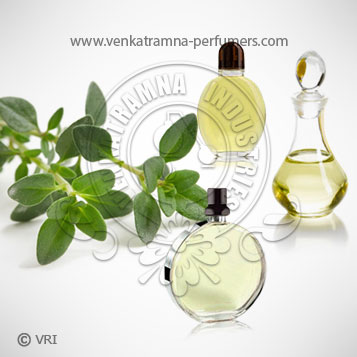
| Botanical Name | Thymus Vulgaris |
| Common Name | Thymus vulgaris. |
| Country of Origin | Spain |
| Solubility | Insoluble in water, soluble in alcohol and oils |
| Specific Gravity | 0.9494 @ 250°C |
| Optical Rotation | -3.0 |
| Refrective Index | 1.5096 |
| PlantPart | Leaves |
| Bland With | Bergamot, Grapefruit, Lemon, Lavender, Rosemary and Pine. |
| CAS No | 8007-46-3 |
| Flash Point | 74° C |
| Extraction Method | Steam Distilled |
We offer thyme oil that is very much pure and unadulterated. Trusted by the ancient learning of the Greeks, the Egyptians and the Romans, the thyme oil is derived from an evergreen perennial shrub that is famous the world over for its transcending fragrance. The Greeks used it as incense in their temples whereas the Egyptians used it in their embalming process.
The least conspicuous plants are often the most precious. Thyme creeps low across the ground, closely hugging the body of Mother Earth and clothing her in fragrant robes. Yet, its tiny leaves are barely noticeable lest it is in flower. When Thyme springs into blossom, the countryside is transformed, at least in the dry and inhospitable places that it prefers to make its home. Each year in early spring, the arid hillsides of the Mediterranean burst into a pinkish purple, sweetly scented, wonderland, abuzz with delirious bees that are lapping up the copious nectar. In ancient times it was customary for Ladies to embroider scarves depicting a sprig of Thyme with a bee hovering above, which they would give to their knights - presumably as an alluring symbol of natural attraction. Thyme was thought a fitting scent even for the Gods. Its name derives from the Greek word 'thyein', which means 'to burn as a sacrifice', implying its use as incense. Thyme may be humble, but it is packed with power and was once thought to convey courage, strength and bravery. It was used as a strewing herb and as fragrant bedstraw, especially for women in childbed. Yet, it also had connotations with the Otherworld and the realm of fairies. The 'hillside where the wild thyme blows', was thought to be the entrance to their lovely realm. Thyme was also often planted on graves and used in embalming lotions. Sprigs of Thyme are worn for remembrance and to alleviate grief and sorrow. Although Thyme is no longer revered as it once was, it is still considered very important, not just as a culinary herb, not least as a source of Thymol, one of the best and most effective antiseptics known, which even now is widely used as a wound dressing and in cleansing agents.
Color : Yellow color with Strong Pungent odor,
Aroma : Thyme Essential Oil has a spicy, warm, herbaceous scent. It is very powerful and penetrating, with medicinal and green tones.
a-thujone, a-pinene, camphene, b-pinene, p-cymene, a-terpinene, linalool, borneol, b-caryophyllene, thymol and carvacrol.
Thyme oil rejuvenates the nerves, sharpens memory and concentration, helps combat exhaustion and depression, fortifies the lungs and helps in curing colds, coughs, asthma, laryngitis, sinusitis, catarrh, whooping cough, sore throats and tonsillitis. As such, it finds wide usage in the pharmaceutical industry.